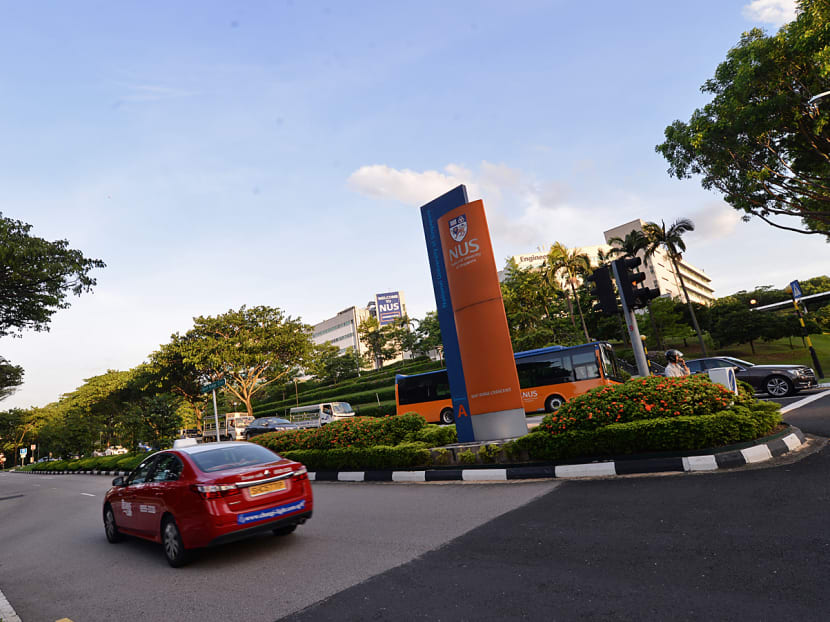NUS to let students design their own modules, widen door for enterprising polytechnic graduates
SINGAPORE — From August, all undergraduates at the National University of Singapore (NUS) will get to choose what they want to learn, how they learn and who they learn from, for a portion of their curriculum.

Under the new, optional Design-Your-Own-Module (DYOM) initiative, students at NUS may take up to four modular credits from their Unrestricted Electives Modules (UEM) to pursue subjects of their choice.
SINGAPORE — From August, all undergraduates at the National University of Singapore (NUS) will get to choose what they want to learn, how they learn and who they learn from, for a portion of their curriculum.
Under the new, optional Design-Your-Own-Module (DYOM) initiative, students may take up to four modular credits from their Unrestricted Electives Modules (UEM) to pursue subjects of their choice.
At a briefing on Friday (Feb 8), NUS Senior Deputy President and Provost Ho Teck Hua also announced two other schemes focused on admissions for the new academic year — including one where polytechnics can nominate students with entrepreneurial skills for admission into NUS.
Under the other scheme, NUS will extend its bonus admission points policy to polytechnic, NUS High School and International Baccalaureate (IB) graduates, in addition to A-Level applicants.
DIY MODULES
For modules under the DYOM initiative, students may select course materials, assignments and assessment criteria with the guidance of an NUS faculty mentor. “They can even choose their own class schedules and classrooms,” Professor Ho said.
Students keen on designing their own modules must organise themselves into a group of at least 10, and then submit a proposal to their faculty for review and approval. The group can be made up of undergraduates from different courses and year of study.
They can invite a guest speaker from the related industry to tutor them, or select modules from online courses offered by edX, a non-profit massive open online course (MOOC) provider.
“In a way, we’re doubling the offering to the students,” said Prof Ho. NUS currently offers about 2,000 modules in a semester, while edX provides over 2,100 courses from partnerships with 89 top universities around the world.
Its offerings include Blockchain Technology by the University of California, Berkeley and Climate Change: The Science by the University of British Columbia.
Undergraduates can choose to do a four-credit, 120-hour module or a two-credit, 60-hour module. All DYOM modules will be graded on a satisfactory/unsatisfactory basis and will not contribute towards a student’s cumulative average point.
“Students can now pursue knowledge in niche areas currently not offered by NUS courses and access top university courses as well as teaching by industry leaders,” said Prof Ho.
Some NUS students told TODAY the initiative sounded interesting but had concerns about their workload.
First-year student Jordan Tan, 21, said “the idea is good” but felt it could increase stress for students. “School is tough enough. If we are thrown to design our own modules without help, it won’t be easy,” said the Faculty of Science and School of Computing undergraduate.
Third-year Communications and New Media student Nur Shaheera said that “it seems like a hassle having to design our own modules”.
But the initiative may help fill the gap for courses that are no longer available in NUS, she said.
“There aren’t many photography modules anymore. Having to self-source for experts or courses seems tiring, but it might turn out to be fruitful in the end,” said the 22-year-old, who is interested in photography.
Prof Ho said faculty mentors will help to guide students all the way. They will set assessments, supervise discussions and ensure that guest speakers are competent in the fields of study.
He added: “Alongside help from the faculty, this scheme encourages students to be independent. Decide for yourself what you want to learn, who you want to learn it from, and how you want to learn it.”
HIGHER INTAKE OF POLY STUDENTS
NUS is also “opening its door wider” to enterprising polytechnic students, said Prof Ho.
It is working with the five polytechnics to receive nominations of graduating students who have displayed entrepreneurial qualities.
Of about 7,800 undergraduates admitted last year, 1,200 freshmen were from polytechnics — nearly one in six of the cohort. This number has risen over the years. In 2014, for instance, polytechnic graduates formed about one-eighth of the batch, or 800 out of 7,100 freshmen.
The university will consider up to 200 nominated polytechnic students in total, with each polytechnic nominating up to 40 students.
The nominees must also apply to NUS and, if their academic results do not meet NUS admission requirements, they will be interviewed and considered for discretionary admission.
Polytechnic students admitted through this route will complement NUS’ industry partnerships and experiential entrepreneurship education, such as the highly popular NUS Overseas Colleges (NOC) Programme and the NUS Enterprise Summer Programme. Since 2002, over 2,800 NUS Overseas Colleges alumni have established over 370 companies globally.
“This entrepreneurship scheme is all about pursuing passion. We believe we have a good ecosystem for them to leverage on, and NUS aims to open this door for them,” said Prof Ho.
BONUS POINTS FOR POLY, NUSHS, IB GRADUATES
Last year, NUS began awarding bonus points to A-Level students applying for their first-choice programmes, resulting in about 9 per cent more A-Level applicants offered admission to their top choices in the current academic year.
According to a preliminary analysis by NUS, these students are doing as well as those who were admitted to the same course without bonus points.
Following this, NUS will extend the bonus points policy to applicants from polytechnics, NUS High School and the IB programme for admission in AY 2019/2020.









